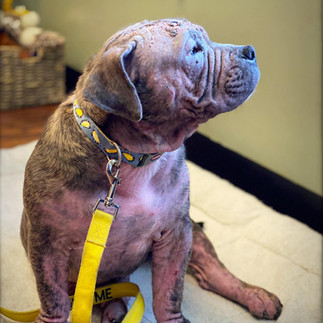Why is my dog (or cat) so itchy? – Allergies in pets
- Dr. Beth Mehaffey
- Sep 25, 2022
- 9 min read
I’ve been debating on writing about allergies for a while now. This is not a very exciting or flashy topic, lol, but I decided it was time to cover it because it is such a common discussion in the veterinary world. This is a LONG blog – but I don’t think it is possible to do this topic justice without being thorough, so here we are.
Allergies are annoying. There, I said it. We are ALL annoyed by them – from the itchy pet, to the frustrated owner, to the tired of talking about allergies veterinarian and veterinary staff. We talk about allergies every single day, usually multiple times a day!! So let’s hash it out….I’m going to use this blog to cover the basics of understanding allergies, so that this can be a reference for our clients to maybe help at least a few itchy pets out there!
Let’s start at the beginning. The basics of what allergies are. When our immune system overreacts to something it is exposed to – whether that be pollen or grass, or chicken, or grain mites (the list goes on and on), our immune system sees this ‘compound’ as foreign and it stimulates an excessive response to it – a reactive response that triggers it cascade of itching and other signs. The most common sign of allergies in dogs and cats is itching – scratching at their legs or body, chewing between their toes, scratching at their ears, etc. But allergies can also present as recurrent ear infections, and secondary skin infections, anal gland issues, or even eye infections! Of note, allergies can also cause GI upset (like vomiting and chronic diarrhea, but that’s another topic…so we are going to focus on skin allergies for today!). I think it is really important to take a minute to reiterate that the ears are an extension of the skin – so ear infections are often not as linked to allergies in people’s minds, but they sure are in my mind!!
Ok so now we have an itchy pet with some of the above signs, that’s step one. Step two, is talking about why. There are 3 types of allergies:
Food allergies
Environmental allergies
Flea allergies
Food allergies are straightforward – the pet is reacting to the protein that is in the food they are eating. NOTE – they are reacting to the PROTEIN – not the grains or the other ingredients, it is pretty rare for dogs to have allergies to anything other than the protein in the food! So, we are talking about chicken, beef, lamb, etc – and those three are the three most common food allergens, for sure. It’s also good to note that even if they have been eating the same food for years, these allergies can develop over time, or change over time – so they don’t have to coincide with a food change!
Environmental allergies are more complex – these can be grass, or pollen, or cat dander, or human dander, or to grain mites in their food, or to any other number of things….just like people these allergies are often complex and much harder to avoid in our management. They can also present as a very seasonal problem (every September my dog gets a skin infection, but the rest of the year he is fine!), or it can be year-round, on and off.
Flea allergies are the easiest to manage – kill the fleas and keep them on a good preventative, and the allergy signs resolve! The are allergic to the bites of the fleas – their saliva, so if you just keep the fleas controlled, you are good to go with this one!
The last point I think I should make here, is that allergies also don’t always follow these rules – very often one poor pet can have food and environmental allergies, or can have allergies to more than one thing. So again, allergies are annoying.
Now that we have identified the types of allergies, how do we differentiate them and then how do we treat them?? As far as identifying, there are a few things you can do! If we want to be as definitive as we can, then a dermatologist is the way! Veterinary dermatologists are well-versed at allergy testing and management and have the capabilities to do the most advanced testing we can to identify the allergies, and then even possibly formulate allergy injections/vaccines that are tailored to your specific pet. In more severe cases, this is often the way to go!
For animals with more mild signs, then we usually go after allergies by using a process of elimination tactic. If we can eliminate fleas, and if we can eliminate food allergies, then we are left with environmental allergies. In my opinion, it is always worth ruling out food allergies, because if we can, then we can avoid needing medications long-term, and I think that is always worth trying! If we can’t, and their allergies recur despite our best efforts – then we are left with managing long-term with daily medications and treatment, just like people with allergies.
Let’s start at the beginning – someone calls and makes an appointment for their itchy dog; we’ll call her Lola. It has been going on for 1-2 months, but has been getting worse, and this is the 3rd time that they have come in for this problem over the last 2 years – all at different times of the year, and she is now 3 years old, and has been on the same food since she transitioned from puppy food to adult food. When she comes in for her appointment, she has itchy and red ears with lots of discharge, and redness between her toes, and scabby areas with redness and flaking skin on her belly. Lola has a secondary ear and skin infection!
*Important point #1 – all allergy treatments and management will fail if you don’t FIRST clear up any secondary infections!! These infections cause itching and irritation, and allergy treatments alone will NOT clear the infections! And other things – like mites, or yeast infections, and bacterial infections, can all look like allergies and need to be resolved first so we can better assess how to manage them long-term!
So, we start her on ear medications and antibiotics for her skin infection, and an allergy medication to help with her itching. We have a long conversation about food allergies, and note that she has been on a chicken-based food, so we decide to switch her to rule out food allergies. We go with a prescription diet food called HP – this is a hypoallergenic food that is derived from soy protein, so it avoids all of the animal proteins and is the gold standard for food allergies! We plan to feed this diet for 8-10 weeks, and then check in to see how she is doing and plan from there!
*Important point #2 – You don’t have to go with a prescription diet food to be successful, it’s just the strictest diet that exists to really let us know without a doubt that there is a food allergy! Feeding this food doesn’t mean you have to feed JUST that food for the rest of his/her life, but it does allow us to know if it’s food, and then come up with a plan for feeding from there with that information! An over-the-counter food that is limited ingredient (Just ONE protein source – read the label!), and is a novel/new protein (think duck, venison, salmon), is a good choice too! Or there are some people who are more comfortable home-cooking their diets too, which is another great options! Just make sure whatever you go with HAS GRAINS in it (grain free foods can cause heart disease in some dogs – that’s another topic for another day – see my previous blog on that one!)
*Important point #3 – A diet trial can take up to 8-10 weeks to be fully effective! In that time, it is imperative that we feed ONLY the food and protein that we have selected. Think of a kid with a peanut allergy – even one peanut can cause a reaction, right? So if you dog is allergic to chicken and you give him a piece of your chicken from dinner one night, that can affect him and make him itchy for days and make our food look like it fails! On the same train, they can be itchy for up to that full 8-10 weeks while the food is giving the body time to calm down – so we often still need itch medications during this transition to maintain their comfort!
Back to Lola…let’s pretend in scenario #1 she does awesome. Her skin and ears clear up, her itchiness goes away, and she looks wonderful! After a few months of maintaining on the prescription food, we decide to slowly transition her to an over-the-counter duck-based food, and she continues to do well, no issues and she goes off on her merry way!
Too happy, right? Ok, how about scenario #2 – her skin clears up and she does great….until she weans off the itch medication. We add it back in to keep her comfortable to give the food the full 10 weeks, and try to wean off again – she’s right back to itching. Well, dang. This doesn’t look like a food allergy – now what?? Now we go down the road of chronic management. We can’t ‘fix’ environmental allergies, we have to manage them, just like a person. And just like in people, there are a bunch of allergy management options because there is not ONE thing that always works for all pets! So, this can be a frustrating trial and error of trying to figure out what works best for each pet.
I like to think of management for allergies like this in 3 tiers of treatment:
Low grade allergies – these are the guys who are mildly itchy, only rarely get secondary infections, and overall, it’s a nuisance problem. These pets can often manage well with low-grade treatment too. Over the counter anti-histamines can be helpful here – this would be things like Benadryl, Claritin, Allegra. Yes, these are safe to use in MOST dogs (and Benadryl in cats!), but a big disclaimer is that you should never use them without consulting with your veterinarian first to ensure it is safe for your pet! Some dogs or cats do great with a combo of Benadryl and regular baths, and ear cleaning, or foot wipes, and that is all we need to do!
Seasonal allergies – this is like the dog I mentioned earlier who gets a skin infection every September. This can be any season of the year, though spring and fall are most common, and they are completely normal the other 8-9 months out of the year! These guys often benefit from just treating them seasonally! Adding in something for itchiness as soon as their season starts (over the counter if it’s mild enough, or a low-grade steroid or long-term allergy medication from us if it’s more severe), treating an infection as needed, and weaning them off the medication once their season has passed!
More severe, year-round allergies – this is the final category, the most difficult one. These pets usually need to stay on something daily for treatment, and can even still have break through allergy issues or secondary infections. Our top choice treatments are Apoquel and Cytopoint.
Apoquel is a daily allergy medication that modulates the immune system instead of suppressing it (like steroids do), so it is safer to use long-term than steroids, but still can have some effects on the body over years, so regular bloodwork should be monitored. This medication has been a life saver for so many dogs, and is definitely my go-to with chronic allergies!
Cytopoint is an allergy injection that is given once a month for 3 months, then every 8 weeks long-term for management. It is an antibody and works by binding the cells that are triggering the itch cascade to cut it off and manage their itchiness. It is SUPER safe, and has also been a life saver for many pups! Unfortunately, both of these medications are only approved for use in dogs, so in cats we are more limited and have to use low doses of steroids long-term, or Apoquel off label, and have to be much more careful with our management!
*Important point #4 – There is an 80/80 rule that I think is helpful with allergies. Well-managed pets are 80% comfortable, 80% of the time. There is no CURE for allergies – we are managing it. So even a dog or cat who is on all the right things, and we can’t manage better, can still get secondary infections or have flare ups! It’s more about averages and how they do over time that we have to focus on.
Let’s end back with Lola – we start her on Cytopoint injections and it’s like a miracle! Her itching resolves, her coat looks great, and she is happy and comfortable! Her parents bring her in for a quick technician appointment every 8-9 weeks, and she does amazing…yay!! Now, not every pet manages this well, and not every one responds to every medication, but let’s pretend that Lola does great so we can have a happy ending. I’m hoping that if you have made it this far, you have a better understanding of how we approach allergies, that can help you and your itchy pet to get some relief!! And if your pet is itchy – call early and call often so we can intervene and get them under control!
Congrats if you made it this far….whew, we did it!! Happy Fall y’all! 😊

![HH LOGO JPEG[1].png](https://static.wixstatic.com/media/6b8308_9584018a570c455a9aa50f5638eed831~mv2.png/v1/fill/w_156,h_173,al_c,q_85,usm_0.66_1.00_0.01,enc_avif,quality_auto/HH%20LOGO%20JPEG%5B1%5D.png)






















Comments